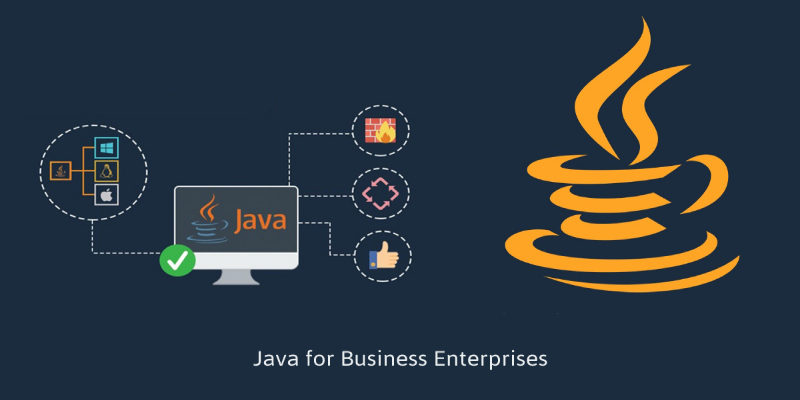
What are the future plans of Java for Business Enterprises?
In the last few months, it has been observed that Java is undergoing some serious transformation. It has recently changed the name of enterprise Java to Jakarta EE and The Eclipse Foundation has full governance over the brand. People who use to code robust, complex enterprise applications moving to an overcrowded DevOps may feel uncomfortable for some time. The best thing is that Java will not be shelved instantly as the goal of the changeover is to offer new innovations for the Java developers to move ahead in the J2ee development world. These innovations will ultimately benefit the business enterprises to gain desired results in terms of ROI, engagement and sales.
Here’s a look at the future plans of Java and what it may mean for the Java Development Company.
A Quick Review of Today’s Java
As you are very well aware, Java is a programming language that relies on object-oriented programming or OOP. When it was first introduced by the Sun Microsystems in 1995, it offered relief from the headache of other programming languages in building web applications.
Indeed, Java offered a lot of help to developers who were quite satisfied to have a cross-platform language to speed up the production code. It was actually designed implement dependencies this led to a method “write once, run anywhere”. This means the compiled Java code is free to run on all the platforms without needing any recompiling of the code. In addition, Java-based web applications became popular for their speed and versatility. Many enterprises consider Java is complex and inflexible to build web applications and looking for other approaches.
A major fact to consider is that people like building Chat Application Project in Java and seeing its faster delivery the popularity will surge in the coming days.
Future Plans of the Eclipse Foundation for Java
1. Progressive Web Apps (PWAs)
Nowadays, people prefer using applications that can operate online as well as offline. PWAs are in huge demand and how Java web apps will compete with it is quite interesting. Current Java is bulkier than other application development platforms used to code in the cloud. But The Eclipse Foundation hopes to overcome its biggest challenge by focusing on the cloud native development. With new & innovative features integrated, developing PWAs in Java is not a challenging task like before.
2. End-User Development
Most of the development job is moving to the end-user to build a fully customized enterprise app experience. Do many people feel if Java can meet this requirement? Java application development requires deep knowledge of coding and technical skills, but people demand applications to be easier and smooth to customize for usage. Stay in competition and ahead of the competition means moving to end-user development. Focusing on End-user requirement will bring desired results as they are the business driver.
3. Focus on Security
The Eclipse Foundation has full governance of Java, how this new platform ensures security? This is a major question striking the minds of developers and Java Development Company as multi-cloud environments and integrations trigger security challenges for businesses. In order to remain the best platform for web application development, Java will need to be innovative by updating security standards for keeping applications protected from cyber threats. Security standards help to ensure both business and customers get a safe platform to execute their tasks.
4. Compatibility
Several innovative technologies like Blockchain, Big Data and the Internet of Things are in high-demand to ease the everyday lives of the end-users. It is important that new Java development platform should be compatible with these innovations. It is quite interesting to see if Java can meet the demands of the changing enterprise market, but with complete governance of The Eclipse Foundation, we should expect to see some new innovation. End-user prefers using applications integrated with latest innovative technologies as they bring a lot of comfort to perform complex tasks.
5. Open-Source
In the last few years, open-source technologies have seen rapid growth in terms of widespread adoption in multiple domains, including virtualization, operating systems, supercomputing, databases, and web servers. The demand for open source technologies has become a critical part of the developer landscape. The Eclipse Foundation has cleared its intentions to focus on leveraging the open-source community for Java.
All indications reveal the Eclipse Foundation is focused on transforming Java into latest innovations to compete with other technologies. The reason behind giving full governance to the Eclipse Foundation was strategic. The idea was to take Java enterprise applications to new heights as it seems outdated to many enterprise operations. It was crucial to allow the foundation to focus on the latest innovative technologies.
The Eclipse Foundation is doing all efforts to make Java more lightweight as well as cloud-ready. The concept is to build a cloud platform where developers don’t have to study snippets of different languages to write one code. Instead, they can code in Java, with a software partner having the experience to offer services in the cloud. However, a few critics think adding a new platform will burden the developers.
So, that is all about the possible changes that we can expect from Java for business enterprises and what’s coming in the near future. The ongoing trend is holding interoperability. Java has partnerships with other organizations to expand the Java community. OpenJDK and Jakarta EE are popular interoperability examples. In addition, the future versions of the Java will get advanced API integration, modular open-source libraries, support and the frameworks. Spring, Kotlin, and other frameworks are also becoming highly popular for building new applications.
Frequently Asked Questions

1. Is Java good for web application development in 2020?
Java is a perfect language for web mobile application development, being one of Android’s preferred programming languages for mobile apps, and also a popular choice for banking apps where security is a major consideration.
2. Which edition of Java is used for Web application?
The Java technologies used for the web application development are Java Enterprise Edition (JEE), Java Standard Edition (JSE), JavaServer Pages (JSP), and JavaServer Pages Standard Tag Library (JSTL).
3. How much does it cost to develop a web application?
The cost of web application development is calculated on the basis of features and functionality needs to be integrated within.
4. Is Java still relevant in 2020?
Despite over 2 decades old, the Java language is still the most stable, secure, and robust programming language. This makes Java as the most desirable languages among developers and business enterprises in 2020. JavaScript is a popular language among developers who work on server-side and client-side programming.
Conclusion:
From its inception in 1990 to the introduction of internet applications and OOP, Java is a leader in the enterprise coding. And even it has critics; it still hasn’t been ousted in the modern-day application development. This is because the cross-platform standard it offers to the developers to build rich and robust applications. With Java getting full governance from The Eclipse Foundation, expect a lot of innovative changes in the next few years. Java will become highly compatible with emerging trends in development and end-user needs. Business enterprises can Hire Java Developer to build engaging, secure and robust web applications to meet desired results. With a quick release cycle along with official support has clearly revealed that The Eclipse Foundation has implemented a hybrid approach that helps to attain both stability and flexibility.

